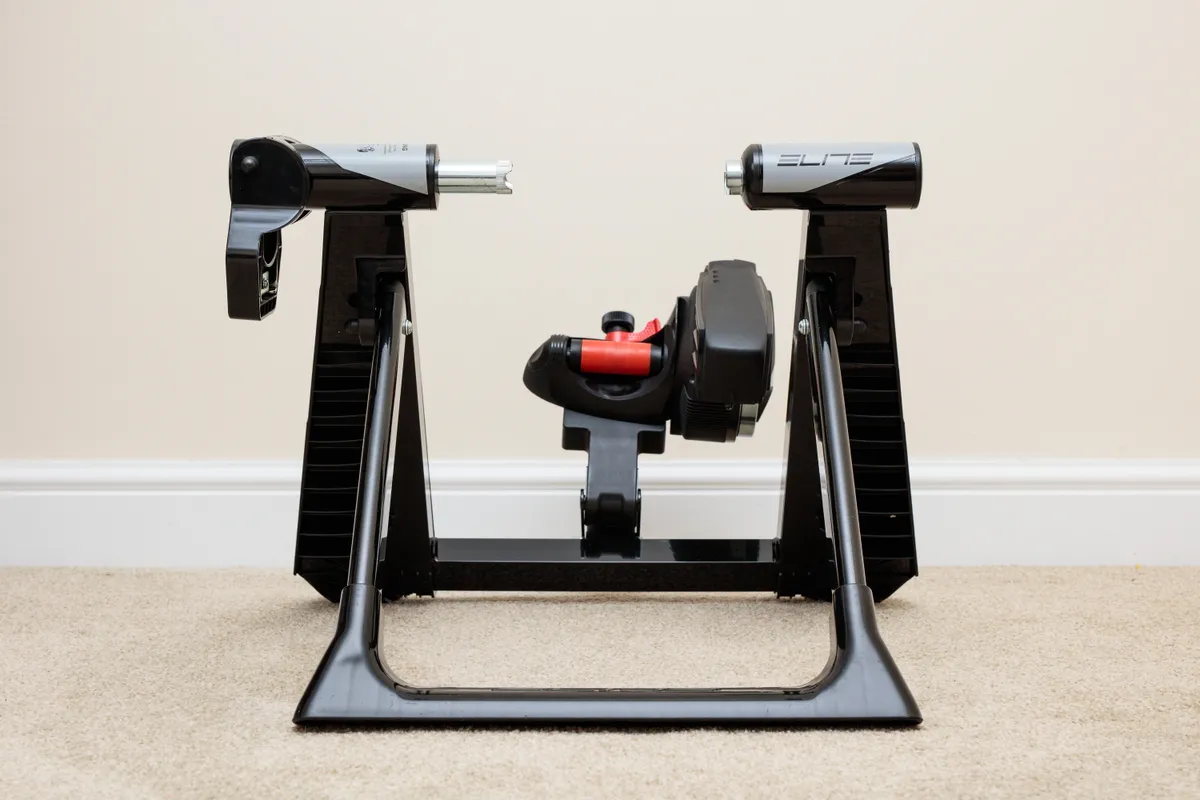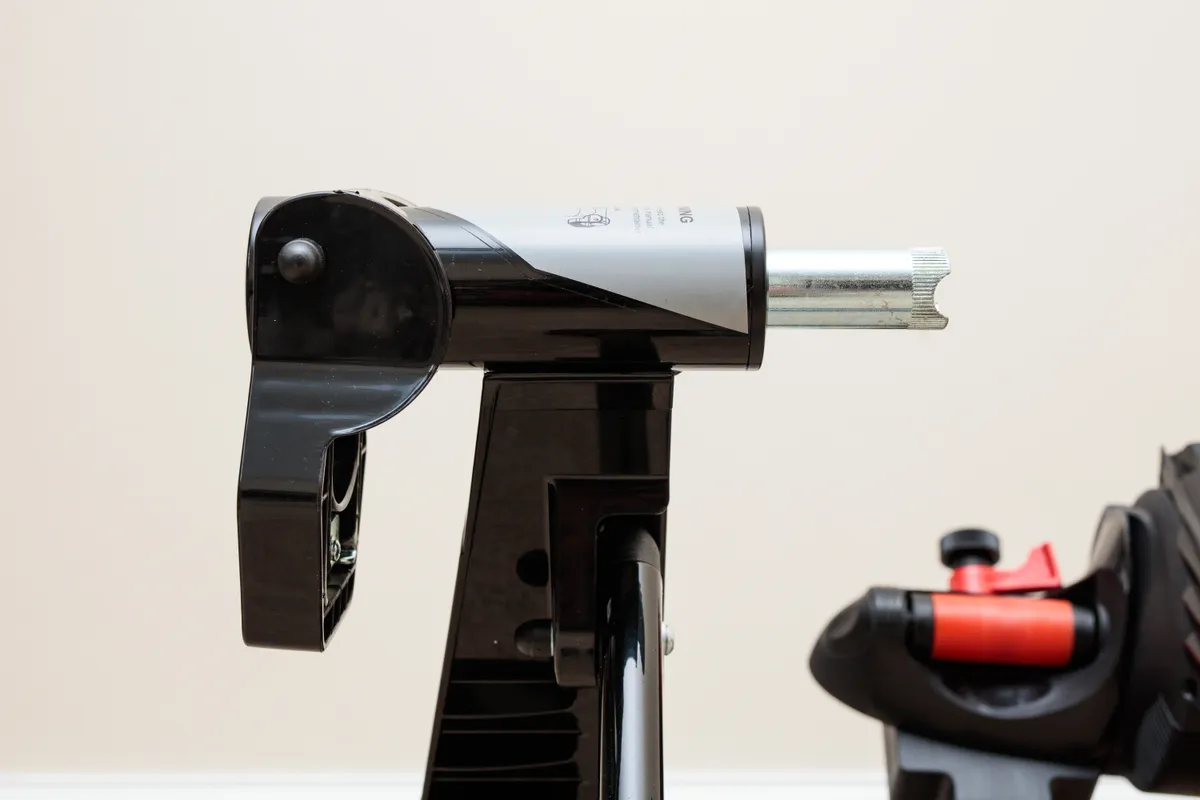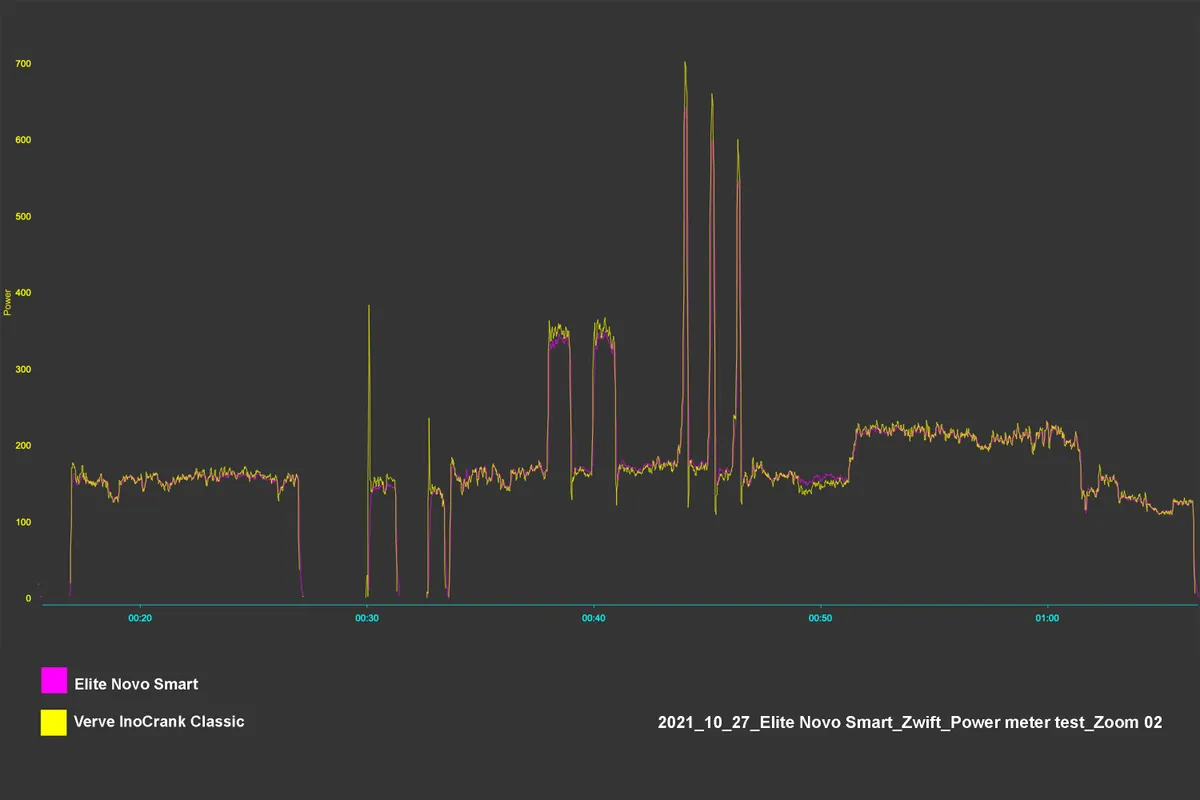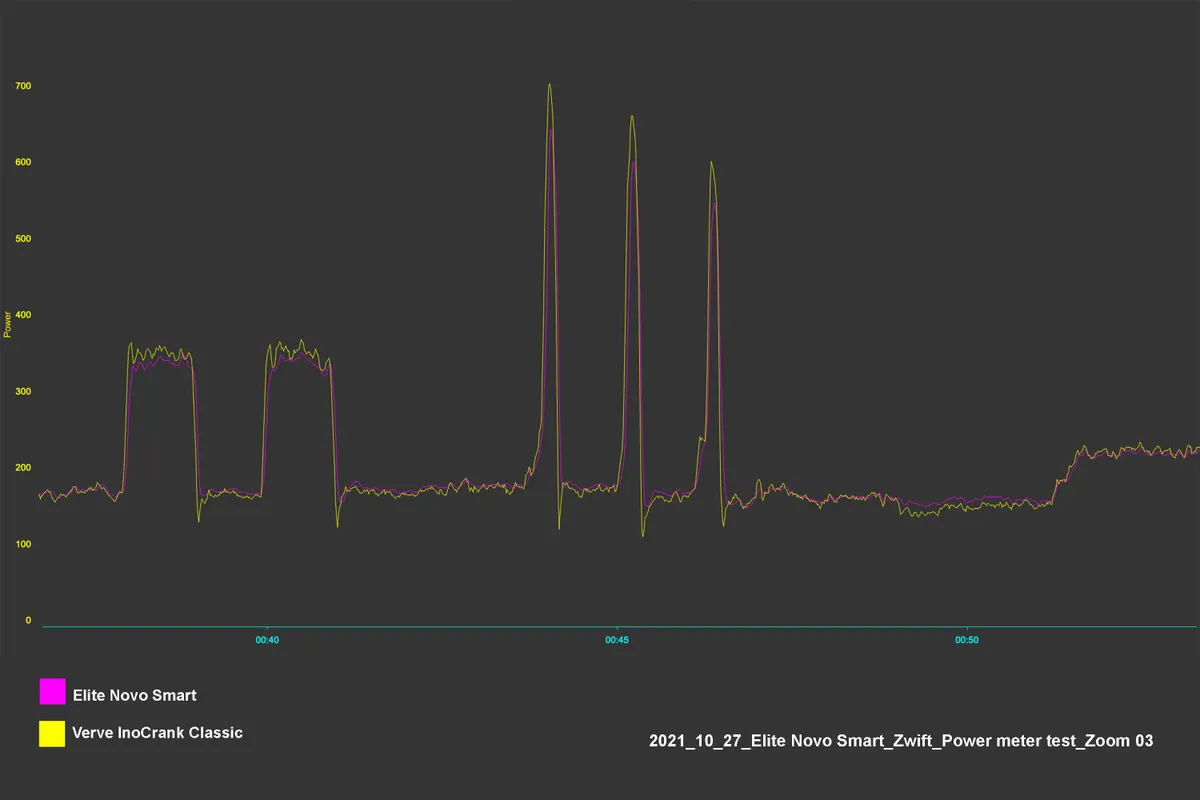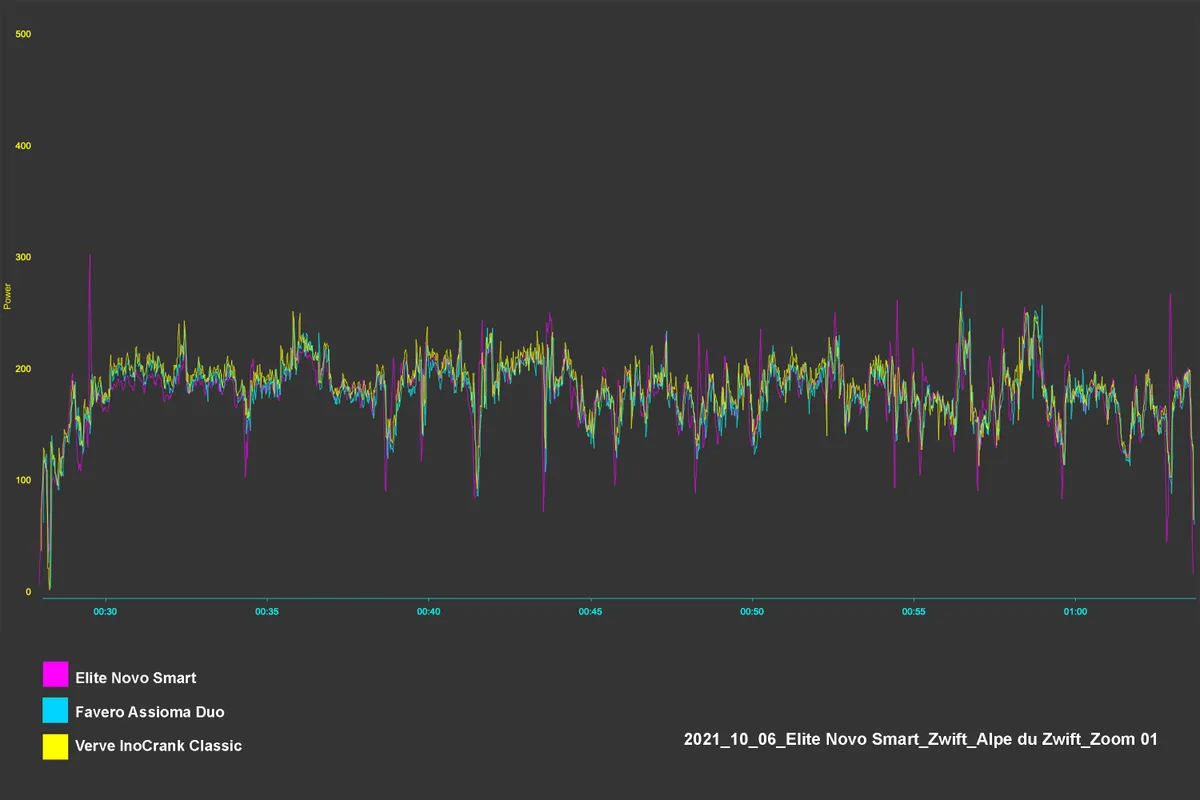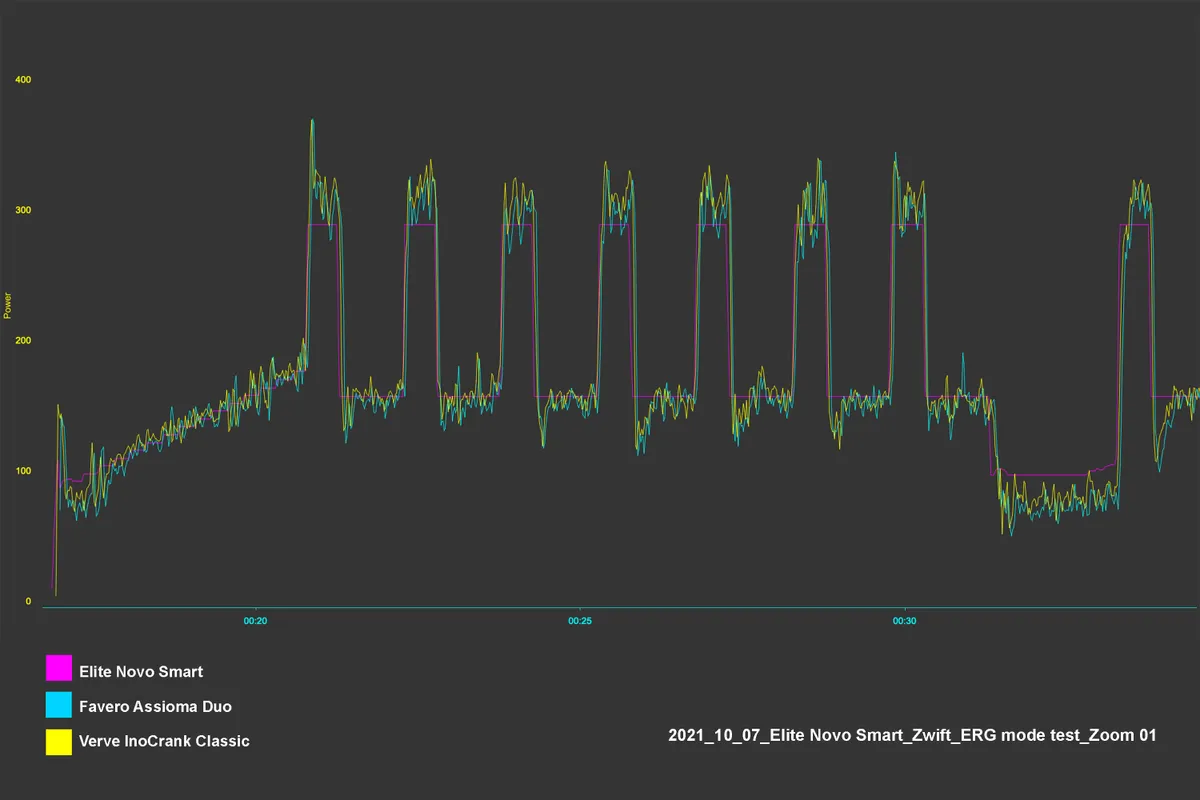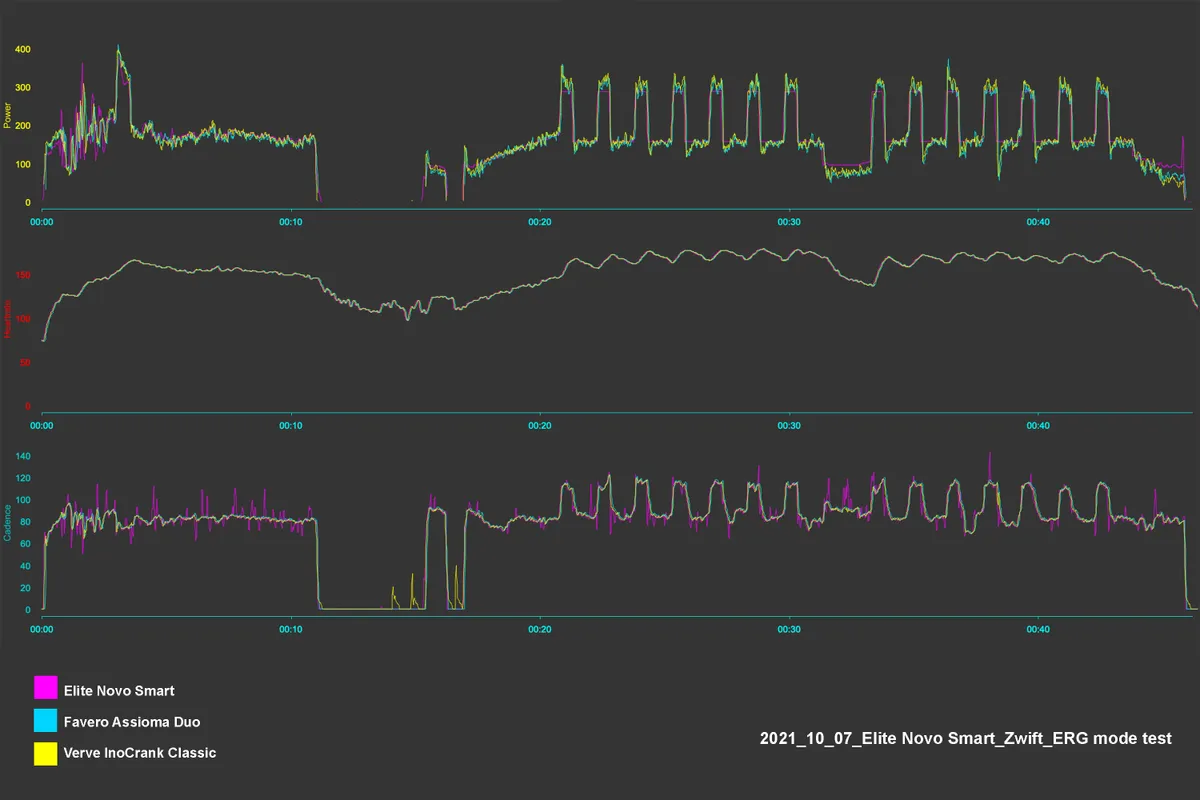The Elite Novo Smart is a budget wheel-on smart trainer that aims to offer the cheapest possible entry point into interactive indoor cycling.
Its spec is modest, but so is its price. This is the cheapest smart trainer Elite offers and it competes directly with other entry-level smart trainers, such as the Tacx Flow Smart.
Despite its budget price, the data produced by the Elite Novo Smart is surprisingly good. Unfortunately, it falls down in other areas, such as ride feel, stability and construction quality – which feels a little low-quality compared to its competitors.
Elite Novo Smart setup
Out of the box, the Elite Novo Smart is split into three parts rather than two, as with the Tacx Flow.
First, you have to attach the roller height adjuster to the support legs, which requires a 13mm spanner not included in the box, then you attach the resistance unit to that. Once that’s done, you can plug it in, attach your bike to the trainer and get going.
It sounds pretty simple and it is once you’ve figured it out, but I found the included instructions hard to decipher because they’re made up entirely of black and white diagrams with no words.
It’s not as idiot-proof as simply bolting the resistance unit to the legs, as you do with the Tacx Flow, for example.
Once assembled, though, you’re good to go – you just need to mount your bike and that’s an easy job. The large quick-release handle on the clamping mechanism makes securing the bike onto the frame very simple.
As is the norm for trainers in this price bracket, the Novo Smart only ships with a 135mm quick-release skewer. If your bike uses thru-axles, you’ll need to source a thru-axle adaptor separately, at a cost of £24.99.
You’ll probably also want to source a front wheel riser block as well because one isn’t included here.
At the rear of the resistance unit, the roller needs to be tightened until it just touches the tyre on your rear wheel, then you turn the locking lever to clamp the roller securely against the wheel.
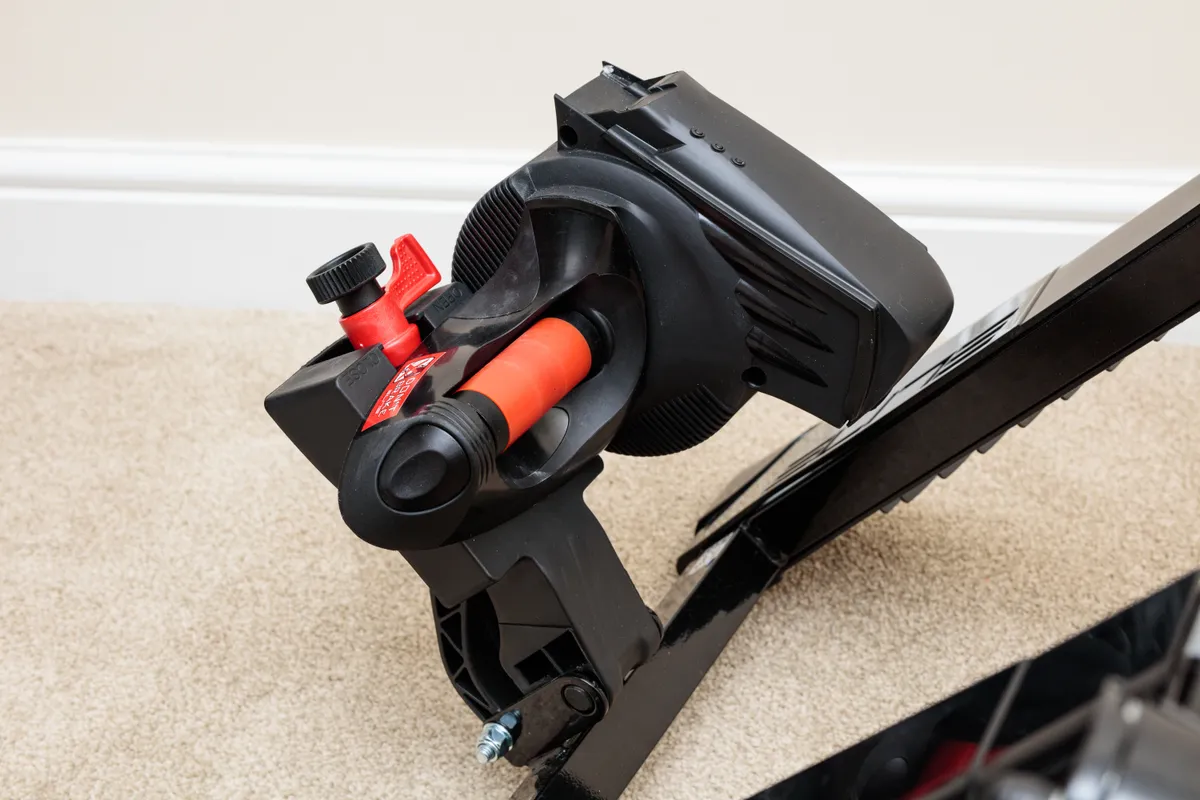
As with any wheel-on trainer, you can opt for a turbo trainer-specific tyre, but a hard-compound or winter road bike tyre, pumped up to a high tyre pressure (Elite recommends 7 to 8 atmospheres of pressure, which is roughly 7 to 7.5 bar / 102 to 117psi) will do a similarly good job, in my experience.
Once you’ve finished your ride, the Novo Smart folds away compactly for storage. Given it weighs just 8.64kg, it’s also easy to carry and move around.
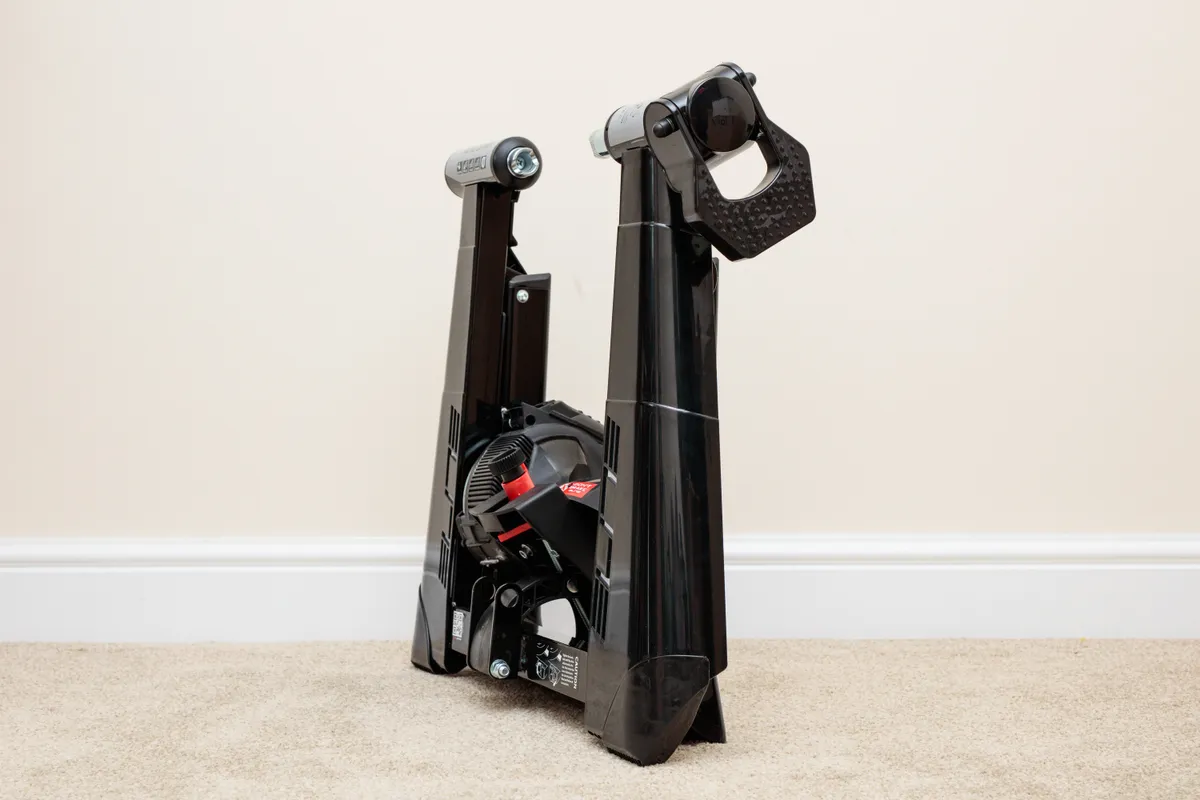
That said, a large portion of the Novo Smart’s weight is located in the resistance and roller unit, with the support legs being very light in comparison. As a result, the weight distribution isn’t ideal for stability.
It’s quite easy to lift one side of the trainer off the floor when getting on or off the bike, so it’s worth taking care not to put all your weight on one pedal when doing this.
Though it’s hard to say which would actually stand the test of time better, the Novo Smart’s construction quality doesn’t feel as good as that of the Tacx Flow, either.
Elite Novo Smart in-use
Connectivity
As with practically all smart trainers, the Elite Novo Smart can transmit data over both ANT+ and Bluetooth.
Connecting to Zwift and Garmin Edge cycle computers was quick and without issue.
One quirk worth mentioning is it’s not possible to perform a traditional spin-down calibration, as you typically do with most smart trainers.
The Novo Smart has a calibration function on Elite’s myETraining app, but you need an on-bike power meter to complete this process.
Rather than attempting to fine-tune the roller pressure, the Novo Smart’s calibration procedure involves comparing the trainer’s power readings to that of an on-bike power meter, in order to produce a power curve (the relationship between the trainer’s roller speed and the rider’s power output), which more closely matches the on-bike power meter.
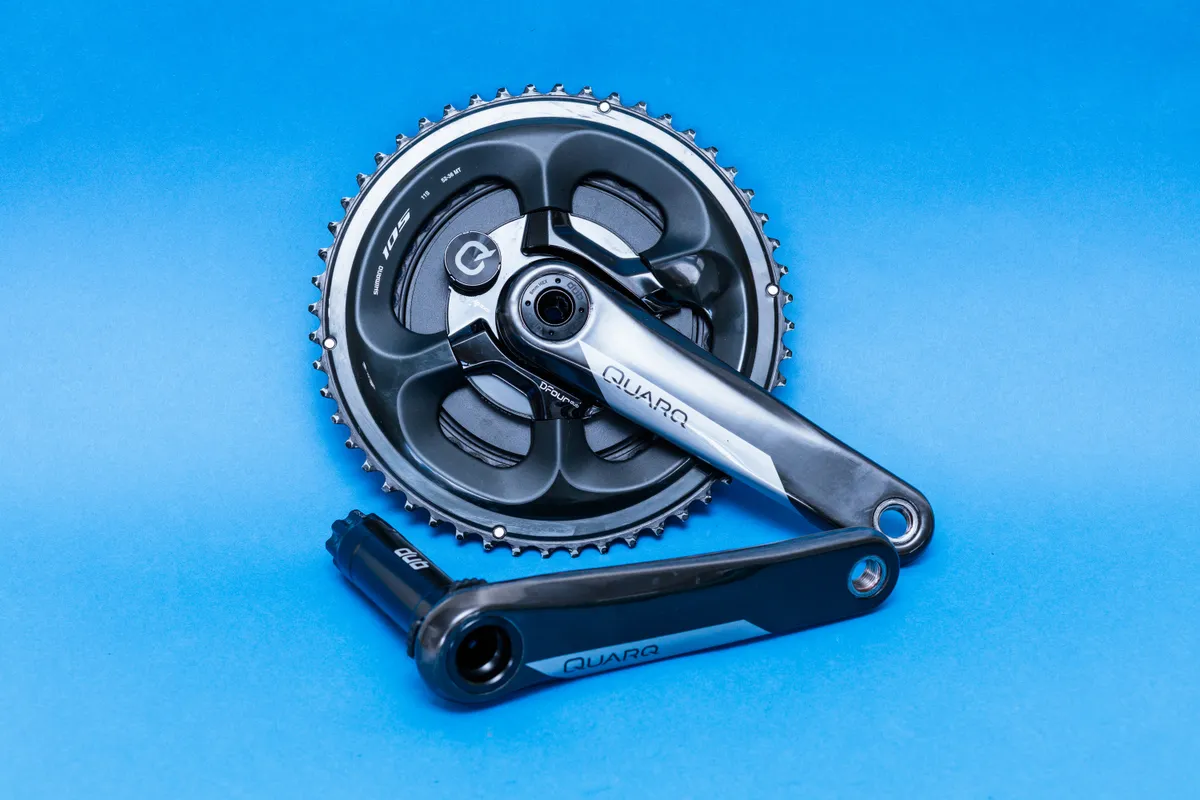
This is great in theory, but I suspect most cyclists shopping for a sub-£300 smart trainer won’t have access to a power meter.
Even if you do, I’d suggest not bothering with calibrating the Novo Smart – just connect your power meter to Zwift, or whatever indoor cycling app you’re using, instead.
Though the Novo Smart’s power and cadence accuracy are impressive for its price (more on this later), regardless of performing this calibration procedure, an on-bike power meter will almost certainly be even better.
To upgrade the firmware, you’ll need to download Elite’s Upgrado smartphone app. It would be preferable if Elite could consolidate these functions into one app, but it’s not the end of the world.
Ride feel
Given the Novo Smart has a relatively small, lightweight flywheel (Elite doesn’t specify an exact weight), ride feel is okay but not amazing.
When just riding along flat or rolling virtual roads, when the flywheel speed is relatively high, the ride feel is at its best.
When climbing steep virtual roads, though, (which result in lower flywheel speeds) things can get a bit choppy because there’s not much inertia in the system.
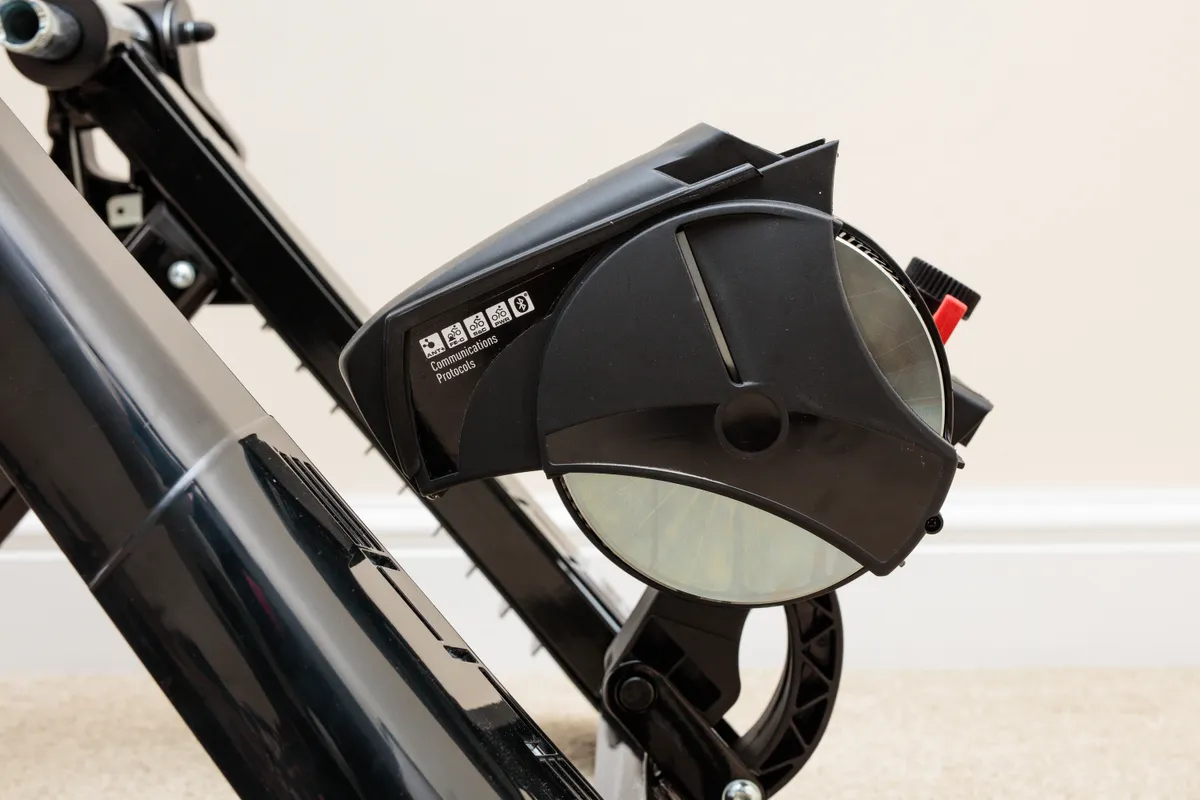
As noted, its lightweight plastic frame isn’t the most stable when riding out of the saddle, either. All that said, though, there’s a large element of “you get what you pay for” here.
Its entry-level price point and 660-watt maximum power output make it clear this isn’t a trainer targeted at powerful riders looking to do sprint training or anyone who wants to win a Zwift race.
That said, the similarly priced Tacx Flow Smart does better than the Novo Smart in this area. For only £10 more (at RRP), it boasts an 800-watt maximum power output and also includes a front wheel riser block, which helps with stability.
The Novo Smart’s 6 per cent maximum simulated gradient capability matches the Flow Smart, though, which is arguably a more important specification for an immersive indoor cycling experience.
As I commented in the Tacx Flow Smart review, though the 6 per cent maximum gradient simulation might appear limiting on paper, Zwift’s default trainer difficulty setting of 50 per cent does negate the effects of this to a large degree.
As a result, the Novo Smart is able to simulate climbing virtual mountains like Alpe du Zwift reasonably well.
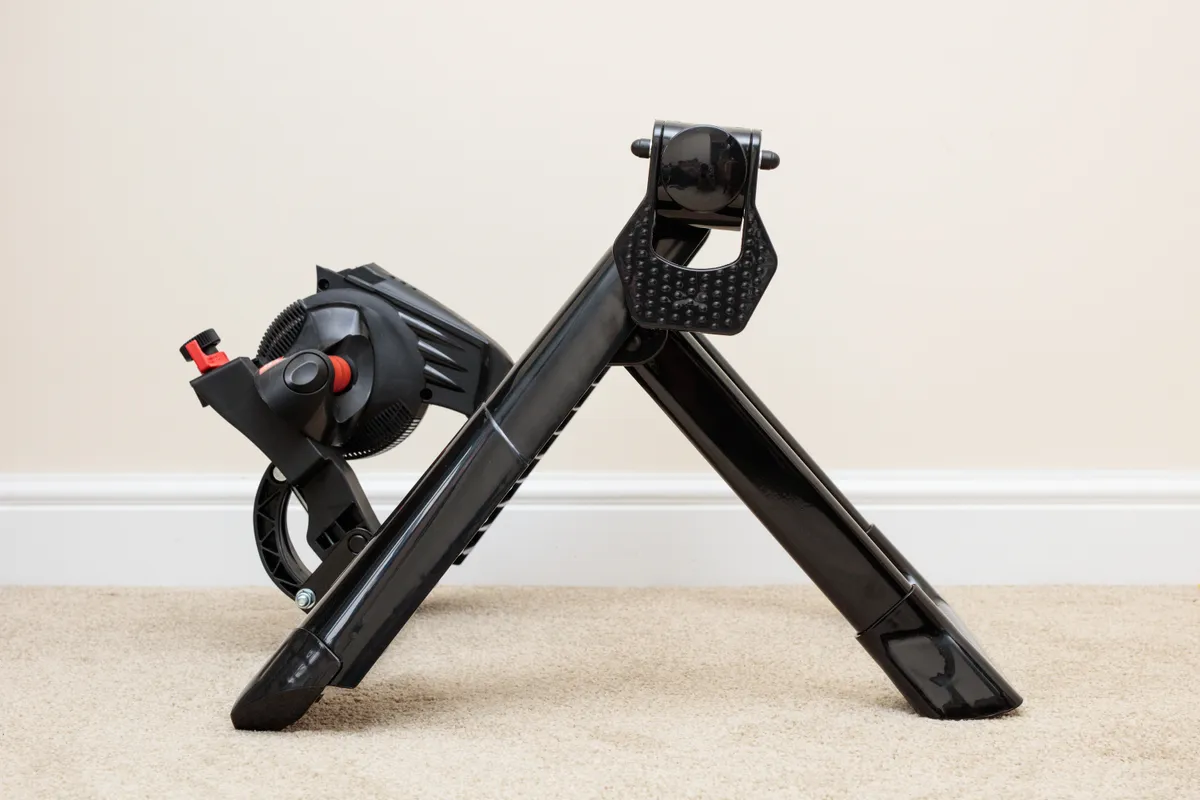
Noise levels are, like with the Tacx Flow Smart, fine at lower wattages and slower flywheel speeds. At 200 watts, the Novo Smart averages around 68dB. That’s not silent, but it’s far from intrusive.
As you start putting out more power and the flywheel speed increases, the noise levels do ramp up. At around 600 watts, the average noise level is more like 75dB.
That’s fairly loud compared to pricier direct-drive smart trainers, but it’s to be expected at this price. A proper, trainer-specific tyre may also bring the noise levels down slightly, but I wouldn’t expect miracles.
If you want to do regular HIIT workouts in the room next door to your family members, then spending more on a direct-drive model like the Elite Zumo is a good idea (assuming you can afford it).
Otherwise, I suspect the noise levels of the Novo Smart will be fine for most people.
Elite Novo Smart power accuracy
Elite claims the Novo Smart is accurate to within +/- 5 per cent, and I found that to be true on average.
As noted earlier, I didn’t perform the calibration procedure involving an on-bike power meter. The factory calibration settings were very good straight out of the box, so it wasn’t necessary anyway.
Similar to the Elite Qubo Digital Smart B+, which uses the same resistance unit, the Novo Smart’s power accuracy tracks on-bike power meters well on a macro level, once properly warmed up.
It can’t react quickly enough to track sudden increases or decreases in power to get perfectly accurate data, but it’s good enough for basic indoor training.
Cadence accuracy is solid too. It can get a bit spiky at times, but in general, it was accurate enough to be useful during settings such as ERG mode workouts.
In ERG mode, the Novo Smart’s responsiveness is fairly good too. It responds to changes in the power output prescribed by a Zwift workout smoothly and quickly, and though it under-reports your true power output, it manages to hold set resistance levels well.
All things considered, the Novo Smart delivers impressive power measurement for its price.
Elite Novo Smart bottom line
The Elite Novo Smart offers a good introduction to smart trainers and interactive indoor cycling.
While its low spec will likely put off more experienced riders, the Novo Smart does deliver on the immersive indoor cycling experience apps like Zwift promise, on a basic level. That it achieves this at such a low price point is commendable too.
The main issue for the Elite Novo Smart is arguably the Tacx Flow Smart. It offers an easier setup experience, nicer build quality, higher maximum power output and marginally improved ride quality, all for only £10 more.
Nevertheless, the Novo Smart is a good entry-level smart trainer option for cyclists shopping on a tight budget.
How we tested
When testing a smart trainer, we consider its price point, how easy it is to set up and what accessories are (or aren’t) included in the box.
Once a trainer is ready to ride, we put it through a series of tests to assess ride feel, power accuracy and how quickly it responds to virtual gradient changes and ERG mode power shifts.
With ride testing complete, we then compare the trainer’s power data to an on-bike power meter, to check whether or not the trainer gives accurate readings on a consistent basis.
BikeRadar’s expert team has tested all of the most popular smart trainers over the years and you’ll find the top scorers in our best smart trainers list, to help you choose the right one for you and your training or racing needs.
Product
| Brand | elite |
| Price | 259.00 GBP |
| Weight | 8.6400, KILOGRAM () - |
Features
| br_mount | wheel_on |
| br_foldingLegs | yes |
| br_trainerType | smart_trainer |
| br_resistanceType | electromagnetic |
| br_connectivity | antPlus |
| br_connectivity | antPlus_fe_c |
| br_connectivity | ble |
| br_connectivity | bluetooth |
| br_deviceCompatibility | android |
| br_deviceCompatibility | ios |
| br_deviceCompatibility | mac |
| br_deviceCompatibility | windows |
| br_noise | 68.0000 |
| br_noise | DECIBEL |
| br_maxPower | 660.0000 |
| br_maxPower | WATT |
| br_maxGrade | 6.0000 |
